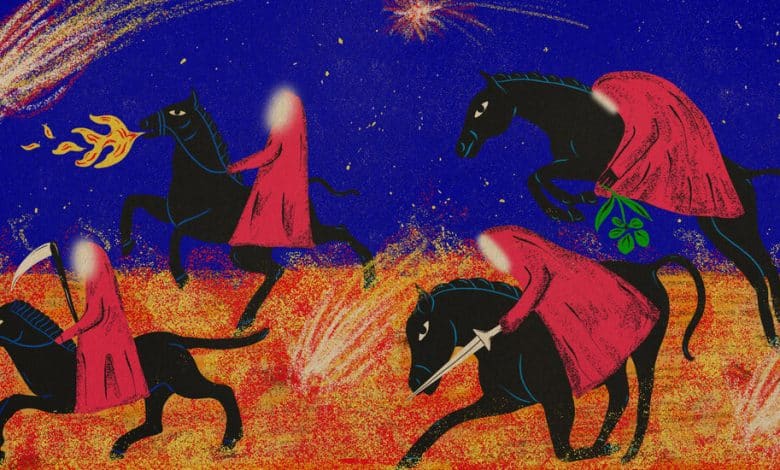Does It Seem Like the End Times Are Here? These Novels Know Better.

On the day my mother died, I sat by her bedside and read the Psalms. The room was quiet — the need for machines had passed — save for the sound of my voice and my mother’s labored breathing. Outside her room, the hospital went about its business: Lunch trays were delivered, nurses conferred, a television played too loudly down the corridor. Out there, time passed in its usual, unremarkable way. In her room, my mother and I had stepped off time’s familiar track.
Everything inessential vanished in her final hours. I read the Psalms because they comforted her. I told her I loved her. She squeezed my hand, which, in that afternoon when she was no longer able to speak, was as profound an expression of love as any words had ever been. When she died hours later, I knew that on the other side of her hospital room door there awaited, at least for me, an altered world.
The subject of this essay is apocalypse, and so I have begun with an ending. If you have lost a deeply beloved, then you have experienced the obliterating finality of death, that catastrophe in the small universe of an individual life. The loss also brings a realization: The “worst thing” that could happen is no longer a future projection; it has exploded into the present.
Apocalypse is generally understood as a future event: widespread suffering, extinctions, various iterations of end-time destruction gunning for us from some tomorrow. Out there, in the vast, unknowable not-yet, apocalypse roars. It paralyzes us with fear, deadens us into numbness or provokes us to hysteria. We are powerless in its face.
But what if we could change our relationship with the end by shifting our perspective on it? The first step might be dwelling more profoundly in the here and now where our crises amass, rather than focusing on the boogeyman future. We already know something about how to do this: We are creatures of loss; we have confronted, or will confront, the “worst things” in the real time of our lives. There is a precedent, then, for how, in this moment, we might collectively approach the apocalyptic worst things. While our beloved still lives, there is possibility: We can give her our attention; we can hold her hand.
I won’t downplay the current horrors — tens of thousands dead in Gaza, conflict in Ukraine, the high-stakes presidential election on the horizon — or imply that all will turn out right. The novels in this essay don’t do that either. Instead, they suggest new ways of seeing: a shift to deeper present-time awareness, even wonder, as the times grow ever more dire. The theologian Catherine Keller calls this “apocalyptic mindfulness.” “A cloud of roiling possibility seems to reveal itself,” she writes in “Facing Apocalypse” (2021). “It guarantees no happy ending. It may, however, enhance the uncertain chance of better outcomes.”
